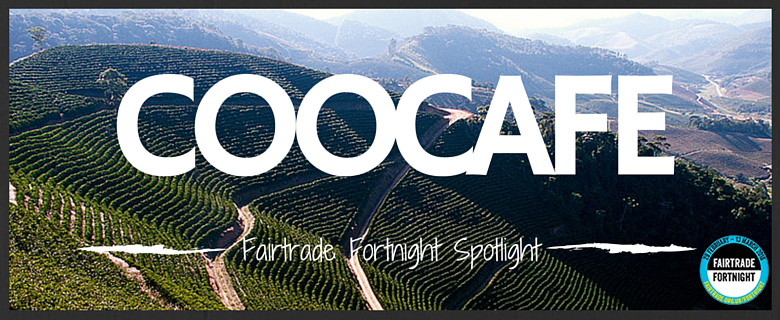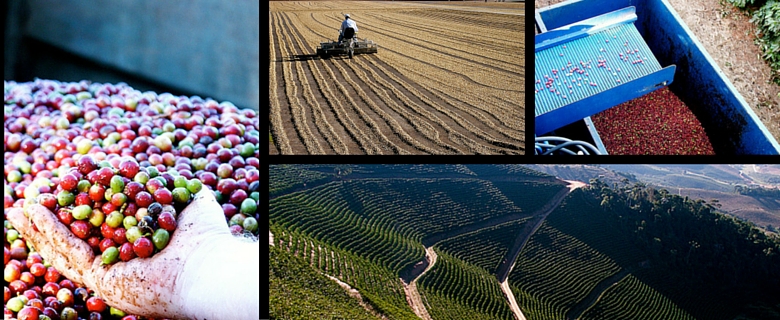Fairtrade Fortnight 2016 Spotlight: Coocafe

During Fairtrade Fortnight, we will be shining a light on the Fairtrade-certified producers that we work with in order to create our award-winning range of espresso blends, hot chocolates and other coffee shop essentials.
Today, we are looking at Coocafe, one of the most influential and successful cooperatives in the coffee-mad state of Minas Gerais, Brazil.
A Town Built On Farming
It is hard to imagine the small Brazilian town of Lajinha being anything other than a farming community. The houses and high streets that wind their way through the undulating landscape only exist to serve those that plough fields and pick crops.
Nestled in the far east of Minas Gerais, Brazil’s second most populous state, the town has always been somewhat out of the way. The town is well away from the sprawling hubs of Belo Horizonte and Uberlandia and it forms part of the Zona da Mata – Forest Zone – of Minas Gerais. It is fair to say that tourism and industry are rather thin on the ground in this part of the world.
But aside from its geographical isolation, the township was created on the back of agriculture. Back in the nineteenth century, before the tower blocks and shops, Francisco Ribeiro set up the Sao Domingos farm and went to work. The rest, as they say, is history.
As the farm grew in size, the town began to take shape. Attracted by the rich soil, fields and attractive lands near Bandeira Mountain more workers arrived. By 1911, the settlement had grown large enough to warrant its own seat on a local council. Two decades on and the village had become a town, and was officially recognised as such in 1938.
Throughout Lajihna’s evolution, farming has remained at its core. Agriculture is the predominant business and many of the town’s population have links to the coffee trade. However, as is often the case, prices can fluctuate on the internal and international markets, making it an unpredictable sector to rely on at the best of times.
In an attempt to secure the long-term future of coffee farmers in the areas surrounding Lajihna, a group of planters joined forces in 1979 to establish the Cooperativa Dos Cafeicultores Da Regiao de Lajinhja – or Coocafe for short.
COOCAFE & Fairtrade
Fairtrade has helped us with various things, with purchasing medicine and everything we need to purchase crops – Irene Tavares Vega

Since their formation in the late-1970s, Coocafe has become more than just a coffee farming collective.
Alongside several other producers, Coocafe forms part of the Responsible Sourcing Partnership (RSP). The RSP – with help from USAID and Fairtrade – works to improve the quality of Brazilian-grown coffee, whilst maintaining ethical and environmentally friendly practices. This joint venture has seen Coocafe improve its infrastructure and farming techniques, which in turn has seen its profits and crop-quality rise.
Over the years, the cooperative has invested these profits in a number of social initiatives. The group has helped open schools in Lajihna and the surrounding area, helping around 1,000 children a year gain assess to a basic education that otherwise would be unavailable to them. As well as this, Coocafe operates the Live Free project that aims to help recovering drug users integrate back into the community.
Today, Coocafe has about 6,500 members – of whom 95% are classified as micro-producers that work on small, family-owned bits of land – and produces about 1 million bags of coffee every year, most of which heads to the export market.
Everybody affiliated with the group has access to expert training seminars and can count on important agricultural, social and economic benefits, namely the ability to receive fair remuneration for their hard work in the field.
At the first Fairtrade meeting held years ago, the Fairtrade representative and I were the only women present….Today, meetings are full of women – Concecao pez de Costa
Fairtrade Creme Supreme
We use coffee sourced from Coocafe’s members as part of our Elly and Creme Supreme espresso blends, specifically, Santos Fine Cup graded arabica.
Grown at altitudes exceeding 1,200m, this high-quality arabica has a distinctly delicious profile of nut and a moreish malty sweetness that is akin to an almond-infused digestive biscuit!
For our Creme Supreme Blend, we mix this with a dash of Fairtrade certified robusta from Tanzania. With its similarly nutty profile and deep body, this robusta compliments the Santos Fine Cup exceptionally well and creates a blend that is ideally suited to flat whites and other, shorter, espresso-based drinks.
Get 20% off Fairtrade Creme Supreme and all our Fairtrade-certified products during Fairtrade Fortnight


